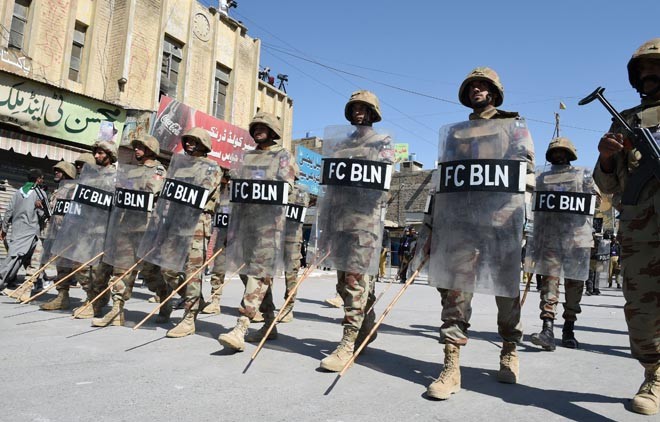
How far has Nacta been strengthened in the last two years?

Since its inception, it’s a common perception that Nacta has not been able to function properly and has remained victim of a power struggle between different entities, such as civil and military intelligence agencies and forces. One example of this is that it took the government three years to present the Nacta bill.
National Counter Terrorism Authority (Nacta) was set up by the government of Pakistan under an administrative order in 2009. However, its powers, structure and mandate were clearly defined in 2013 after the promulgation of Nacta Act.
The main objectives of the authority are to coordinate and unify counterterrorism efforts by devising comprehensive counterterrorism strategies, forward their suggestions to the government for implementation, and act as a think-tank and a coordinating body between various civil and military intelligence agencies and departments.
Against this backdrop, the National Action Plan (NAP) also talks about the utility and necessity of this authority. Its section 4 clearly mentions that "Nacta, the anti-terrorism institution will be strengthened".
The authority has remained without a head for long. Ihsan Ghani, a senior officer from the Police Service of Pakistan (PSP), has been appointed as its national coordinator. On several occasions, the government has announced that Nacta is fully functional but critics have challenged such assertions and raised questions.
Khawaja Khalid Farooq, Former Inspector General of Police (IGP), Punjab and Nacta head, says Nacta was initiated by the prime minister of Pakistan from the framework provided by the Prime Minister’s counter terrorism policy of 3Ds -- Dialogue, Development, and Deterrence, and by a unanimous resolution passed on October 22, 2008 by the parliament of Pakistan.
Read also: Editorial
"This further crystalised into 14 guidelines for National Counter Terrorism Policy by parliament’s committee on national security, where it was stressed that there was a need of a comprehensive counterterrorism strategy, and an even more direly felt need of focal institutions to integrate the entire counterterrorism efforts," he informs.
Farooq says though there have been some breakthroughs, like appointment of a professional head and allotment of above Rs1 billion for buildings, and setting up of Joint Intelligence Directorate (JID), "there are concerns like not holding meetings of Nacta’s board of governors and its failure to form JID, comprising representatives of different civilian and military security agencies," he adds.
The declared objective to form JID was to develop a mechanism where more than 30 intelligence and security agencies can coordinate with each other and collectively fight against terrorism. However, Farooq says in his tenure it seemed some agencies would not take much interest in Nacta meetings. "They would send some junior officers just to show their presence. Nacta has functioned in temporary offices and even now the National Police Bureau (NPB) building is being used for this purpose," he says.
Another point of concern is that the interior minister is keeping Nacta under his administrative control whereas the Nacta Act mentions it must be placed under the prime minister. Farooq thinks there is lack of political will as the prime minister is not taking ownership of this institution.
"The seriousness has to come from the prime minister and things will start improving the day he starts taking interest in it," he says.
Tariq Parvez, former head of Nacta who was part of the founding team, feels that the authority cannot be called functional unless the legal requirement of holding the body’s board of governors’ meeting is fulfilled. He says it is unfortunate that not even a single meeting has been held so far.
The board may meet as and when required but it should meet at least once a quarter of the year. It should comprise prime minister as chairman, minister of interior, chief ministers of provinces, some ministers and federal secretaries, director general ISI, DGI IB, DG MI, DG FIA, IGPs of all provinces, etc, as members and the national coordinator of Nacta who acts as its secretary. In the absence of regular meetings, Nacta cannot review its policies and get approvals for new ones as well as perform its regular functions.
Muhammad Amir Rana, Director, Pakistan Institute of Peace Studies (PIPS) is a bit optimist in this context. He says Nacta is performing its duties well. "For example, it has instructed concerned departments to take action against fourth schedulers, asked FIA to investigate 2,000 money laundering cases, is working on countering violent extremism (CVE) policy that the government plans to announce, and has made recommendations to ban certain organisations, including Jamaat-ul-Ahrar (JuA) and Lashkar-i-Jhangvi al-Alami (LJ-A) to the ministry of interior.
Rana says Nacta has got its own secretariat near Sitara Market in Islamabad. The offices in NPB premises are used by the Nacta chief, and he is also looking after the bureau. "They have also been released an operational budget of Rs22 million so that they can perform their routine tasks. Though the JID is not yet formed and board meetings have not taken place, the inertia has broken after the appointment of the current Nacta chief," he concludes.